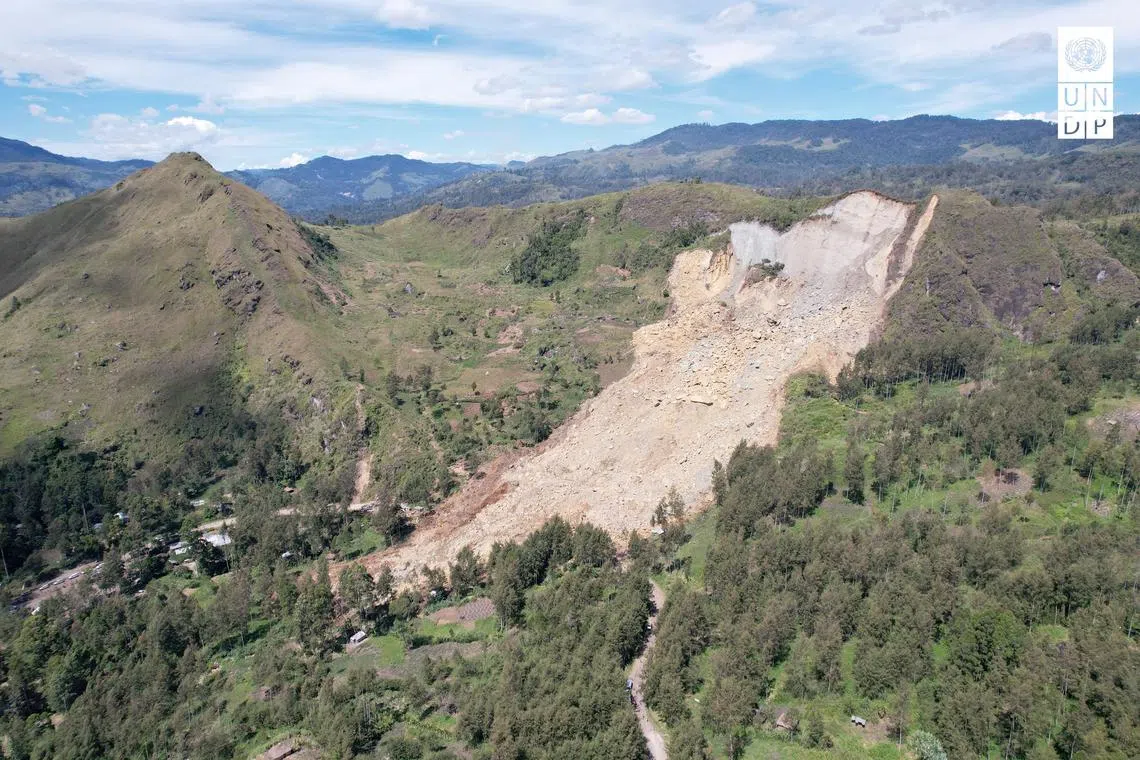Papua New Guinea leader says ‘extraordinary’ weather causing disasters
Sign up now: Get insights on Asia's fast-moving developments

Parts of a mountain in the Maip-Mulitaka area in Enga province in the country’s north collapsed in the early hours of May 24 .
PHOTO: REUTERS
Follow topic:
SYDNEY - Papua New Guinea Prime Minister James Marape on May 29 blamed “extraordinary rainfall” and changes to weather patterns for multiple disasters in the Pacific Island nation in 2024, including a landslide last week which likely killed thousands.
Parts of a mountain in the Maip-Mulitaka area in Enga province in the country’s north collapsed in the early hours of May 24, and Mr Marape said more than 2,000 people are estimated to have died, with up to 70,000 people living in the area impacted by the disaster.
“Our people in that village went to sleep for the last time, not knowing they would breathe their last breath, as they were sleeping peacefully. Nature threw a disastrous landslip, submerged or covered the village,” Mr Marape told Parliament on May 29.
Natural disasters have cost the country more than 500 million kina (S$175 million) in 2024, before the landslide at Enga, he said.
"This year, we had extraordinary rainfall that has caused flooding in river areas, sea level rise in coastal areas and landslips in a few areas," Mr Marape said.
Deputy Prime Minister John Rosso said: “The climate change effects that are here now are not just in Enga. For the last two months we have seen unprecedented disasters throughout the country.”
Defence Minister Billy Joseph arrived in Enga on May 29 with relief supplies including food, water, blankets and tents provided by Australia on two Australian military aircraft.
Australia’s High Commissioner John Feakes said more plane loads with supplies and Australian rescue personnel and technical teams would arrive in Enga in the coming days, the PNG Post-Courier reported.
The United States has pledged 2 million kina for emergency shelter and logistics support, its embassy said.
The authorities have raised concerns about the outbreak of diseases amid warnings of further landslides.
Thousands of people have been ordered to evacuate amid further earth slips in the mountain.
Residents have been using shovels and bare hands to dig through mud and debris almost two storeys high, even as officials said chances of finding survivors were slim
Slow rescue
Rescue teams have been slow to reach the site because of the treacherous terrain and tribal unrest in the remote area, forcing the military to escort convoys of relief teams.
The landslide had hit a section of highway near the Porgera gold mine, operated by Barrick Gold through Barrick Niugini, its joint venture with China’s Zijin Mining. The miner said its operations were not affected.
Mr Marape said the government was working with Barrick to reopen the road. Barrick said it had offered the government more heavy equipment at the slip site.
The United Nations, in its latest update, said a bridge had collapsed on May 28 on the main road towards the disaster area, potentially delaying rescue teams reaching the site.
The UN migration agency has warned of an outbreak of infectious diseases if immediate steps are not taken.
“Every passing minute, bodies buried under the debris are decaying, with water squeezed between the ground, and the vast debris covering an area of three to four football fields is continuing to leak. This is posing a high health risk,” Mr Serhan Aktoprak, the chief of the agency’s mission in Papua New Guinea, said in an e-mailed statement. REUTERS

